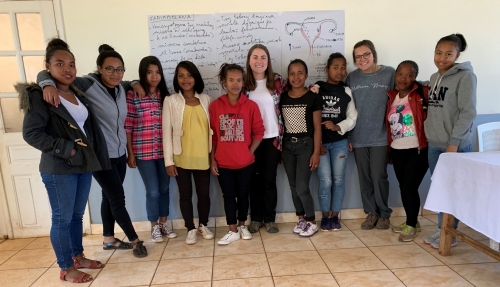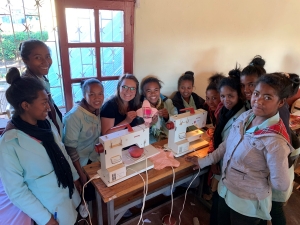A community collaboration to empower women in Madagascar

Senior Morgan Micari (center) and junior Rebekah Hamblett take time for a photo with women from the community who were learning about menstruation.
Morgan Micari, a rising senior, and Rebekah Hamblett, a rising junior, have found their love for health promotion during their summer 2019 internship in Madagascar which is in its winter season. The island is in the Indian Ocean, approximately 250 miles off the coast of East Africa. This unique experience comes as part of Villanova University’s partnership with Catholic Relief Services in the country. The nursing students are working in conjunction with the community in Antsirabe which is in the central region of the nation and its third largest city.

Rebekah Hamblett (4th from left) joins young women in sewing reusable pads after a teaching session about menstruation.
As with many places around the globe, there is taboo and misinformation surrounding periods in Madagascar, leading to a need for education to debunk those myths and teach women and girls not only about their menstrual cycle, but about how they can better manage it at school, home, or work. Rebekah describes their efforts, “We went to a local school and taught some of the girls about the menstrual cycle and answered whatever questions they had, and then spent the afternoon sewing pads with them that they can wash and reuse.” Disposable pads are expensive and effective management of refuse is an issue in Madagascar, according to the students. Undergraduate nursing students have also conducted such programs during experiences in South Africa, using the Days for Girls program in orphanages. Nurse practitioner students have conducted similar education in partnership with a community in Kenya.
“The girls were eager to learn about menstruation and excited to be able to make the pads themselves,” says Rebekah. “We loved facilitating these health promotion activities.” As the nursing students collaborated with the women of the community to meet their needs, the students not only refined their health promotion teaching techniques but also enhanced their world view- a key goal of the Fitzpatrick College of Nursing’s global health program.
